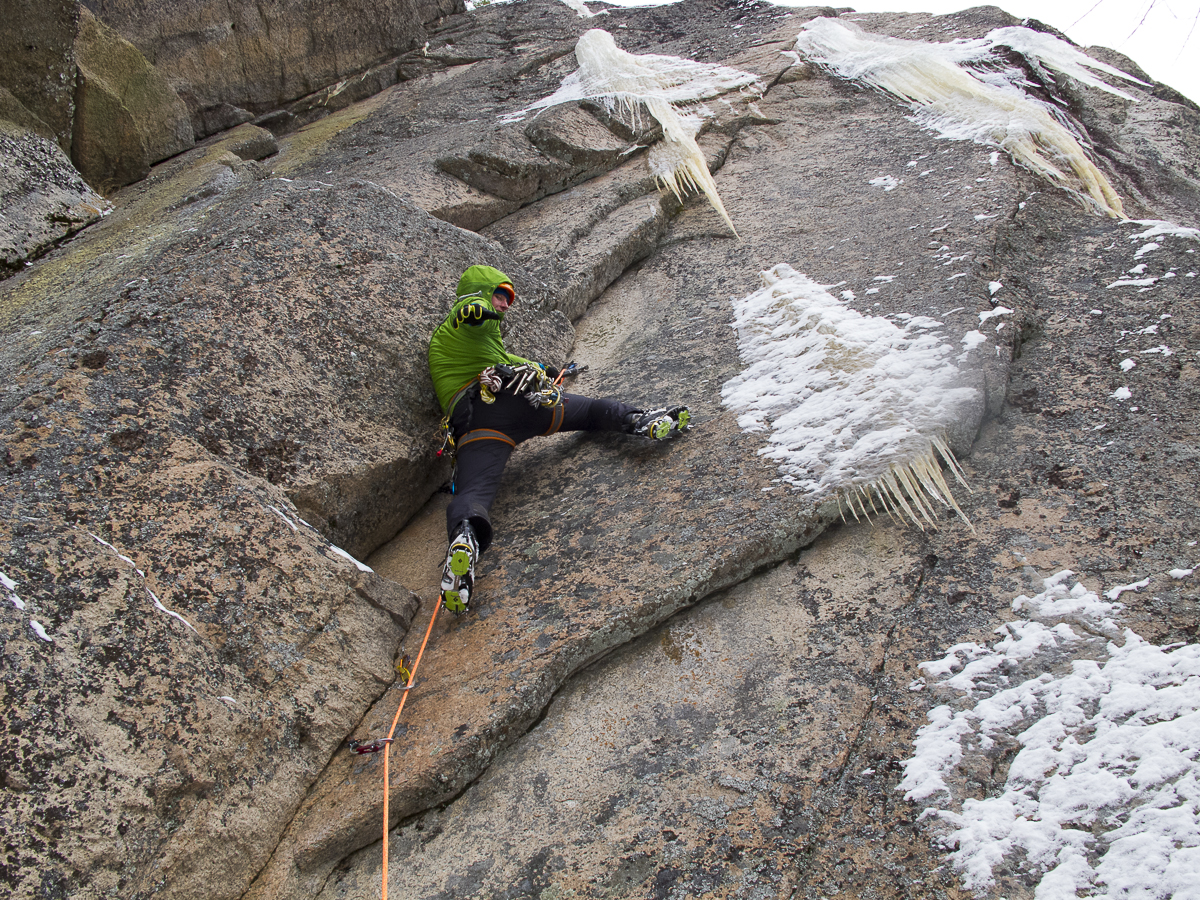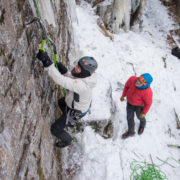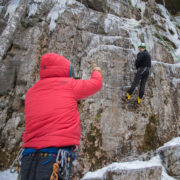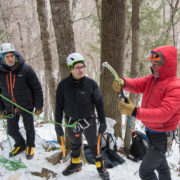Mainstream combined climbing is right here. How can we shield the climbs for future generations?

Peter Doucette shakes out and searches for the subsequent edge, divot or dimple in direction of progress on this try of Cryokinesis. Picture: Ray Rice
THINK earlier than you climb rock with ice instruments. The marks you make will final many lifetimes
We now have to watch out. Dry tooling causes injury to the rock. With time, the injury dry tooling causes turns into tolerated, accepted, and sanctioned by some. This may finally destroy a rock climb and the expertise for future generations of climbers.
It’s actual easy. Be respectful of the rock and it’s setting. Take into consideration future climbers. Preserve your impression to a minimal. Depart as little hint as potential and keep in mind, cumulative injury is all the time the issue.
Some latest posts from Fb on Dry Tooling.
~Thanks Janet for motivating me to do that put up. We want this consciousness.
Janet B. Wilkinson
February 11 at 9:06pm ·
I actually want folks wouldn’t dry device and dry crampon rock routes on Cathedral (or at the least wouldn’t put up photographs right here or elsewhere of it). That features Diedre. There, I stated it.
Richard Parker
Certainly, within the 90’s we noticed important rock injury at Rumney from picks and crampons…these scars are (virtually) eternally!
Nick Yardley
Some ideas from the Lake District, principally if it’s a well-liked rock route it’s price extra as such to the final group.
Bruce Adams
Dry tooling ought to simply go away.
Alden Pellett
Janet, even worse is the rattling rock climbers pondering they personal the cliff and bolting up sport routes the place runout winter combined routes have been put up first!
Michael Wejchert
Sure! Diedre is climbable as an ice route when it’s in; you don’t have to the touch rock on the 5.10 pitch when correctly fashioned. Pondering it’s alright to dry device when it’s naked rock isn’t so sizzling. I do know it’s a bizarre journey down ethics lane for visiting climbers, however take into account: if there’s no ice on a pitch, you’re ruining a basic rock route for future aspiring leaders.
There aren’t any arduous and quick solutions. However listed here are a couple of questions that have to be answered
- The place do aspiring climbers follow their craft?
- What is taken into account unacceptable?
- What are the ethos to protect the climbing expertise for future generations?
- Can common rock climbs and dry tooling coexist?
- How can we cope with extreme visitors on common climbs
-The place do aspiring climbers follow their craft of dry tooling?
Dry tooling needs to be practiced in areas not good for mountaineering and never on established rock climbs.
Practice and refine your expertise on synthetic partitions.
Discover areas the place rock climbers by no means go.
Most climbing areas now have designated cliffs the place dry tooling is accepted. Discover out the place they’re.
Go to alpine areas for the perfect coaching.
Hunt down recommendation and steerage from skilled climbing guides.



Ryan Stefiuk guides members in combined climbing strategies on the Mt. Washington Valley Ice Fest. Photographs: Courtney Ley
-What is taken into account unacceptable?
Dry tooling on common and basic rock climbs with no ice.
Scratching your method up a climb. In case you are inexperienced and at your restrict, take into consideration leaving it for an additional day. Robust and expert climbers can usually do a climb leaving hardly a mark.
Not asking for native info on what is appropriate and the place to go. What’s acceptable at one cliff is totally off limits at one other. Educate your self within the native methods.
-What are the ethos to protect climbs for future generations?
Take into consideration the injury chances are you’ll do to the rock if you happen to climb it with ice instruments.
Take into consideration the cumulative impact of many climbers over time.
Take into consideration future generations, and the way you would possibly change their expertise of the climb.
Have the frequent sense to maneuver on when situations are usually not proper for a non-destructive assent.
Watch out when rappelling. Crampons scratch the rock extra throughout rappels than throughout ascents.
Combined climbers want to consider their actions to forestall future entry issues.
-Can common rock climbs and dry tooling coexist?
NO!
The common consensus is that no common, established rock climb needs to be dry tooled.
If it’s a well-liked rock route, it’s price extra to the climbing group as a rock climb, than as a dry device climb.
Guidebook authors want to incorporate dry tooling areas, info and native ethics. Don Mellor, writer of Blue Traces 2: An Adirondack Ice Climber’s Information, says, “Whereas I’ve no real interest in or proper to inform others what to do of their recreation time, as a guidebook author I don’t wish to be complicit in encouraging folks to scar rock with ice gear.”
Standard rock routes have been climbed in winter for years, however not with the frequency we now have right now. We should concentrate on the cumulative injury we’re inflicting and take motion to forestall it.
-How can we cope with extreme visitors on common climbs?
We have to generate public information and consciousness of the issue.
We want leaders in the neighborhood to advertise good dry tooling ethics.
We have to be particular with what climbs are acceptable to dry device in a given space and ones which can be forbidden.
Posting much less on social media about delicate climbs will assist maintain the visitors down.
Posting extra on social media about good dry tooling ethics and setting good examples is the fitting factor to do.
When you find yourself out climbing, take into consideration the injury chances are you’ll trigger earlier than you climb rock with ice instruments. Most frequently, you may have two decisions. Do, or strive the climb, regardless of the situation or what your impression could be. Otherwise you may be considerate, respectful, and thoughtful of others, the setting and the long run. Make the fitting select for the setting and others. Our climbs and climbing areas are a finite useful resource that we have to shield!
~Doug Millen
Extra on Dry Tooling
The Entry Fund – (pdf) MIXED EMOTIONS: THE IMPACTS AND IMPLICATIONS OF DRY-TOOLING
Sources: Fb, The Entry Fund, Blue Traces,

